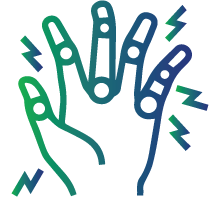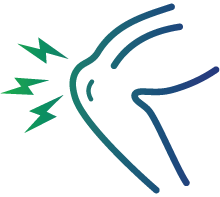
Rheumatoid Factor (RA)
What is Rheumatoid Factor (RA) Test
Rheumatoid Factor (RA) test is used to measure the level of Rheumatoid factor (RF) in your blood. An autoantibody called RF responds to the inflammation caused due to rheumatoid arthritis (RA). When your blood encounters a foreign substance such as bacteria, the level of antibodies increases to fight off the foreign substance. Whereas, autoantibodies target and attack the proteins of your own body.
Long-term (chronic) inflammation is associated with RF. So, if you have RA (inflammatory disease), your risk of having elevated levels of RF may be higher. Although this autoantibody does not directly contribute to the development of arthritis, it does contribute to inflammation when there is joint damage. Approximately, 70% to 80% of people with RA have RF in their blood.
Thus, getting a Rheumatoid Factor (RA) test done is recommended to diagnose rheumatic conditions, persistent infections, or autoimmune diseases like lupus or Sjogren’s syndrome.
Why is Rheumatoid Factor (RA) test done?
- To diagnose rheumatic conditions such as rheumatoid arthritis
- For the purpose of identifying autoimmune conditions like Sjogren's syndrome or systemic lupus erythematosus
- To diagnose chronic (persisting for a long time) infections
Symptoms of rheumatoid arthritis

Joint pain

Tenderness and swelling of the joints

Stiffness of joints

Fatigue

Occasional low fevers

Loss of appetite

Dry eyes or mouth

Firm lumps under the skin

Anemia
Preparation for the test
No special preparation is required for the Rheumatoid Factor (RA) test.
Interpretation of results
The units of measurement for the results are International Units Per Milliliter (IU/mL)
|
Antibody |
Reference interval (IU/mL) |
|
Rheumatoid Factor (RA), serum |
<14.00 |
Deviation from normal levels indicates the following:
- If your RF autoantibody level is less than 14 IU/mL, your test results are considered as negative, and you most likely do not have RA.
- Higher than normal levels (positive results) might be indicative of conditions like RA or other diseases such as Sjogren’s syndrome, Systemic Lupus Erythematosus, inflammatory lung diseases, cancer, and chronic infections.
FAQs
How is the sample collected for a Rheumatoid Factor (RA) test?
A blood sample is collected from a vein in your arm using a small needle. Usually, this process does not take more than 5 minutes.
What are the risks associated with a Rheumatoid Factor (RA) test blood test?
This test involves negligible risk. There might be slight soreness or tenderness around the site where the blood is drawn. Rarely, the site can become infected.
What is the turnaround time (TAT) for the Rheumatoid Factor (RA) test?
Test results of a Rheumatoid Factor (RA) test are usually available within 36 hours after the sample collection, although it could take longer at times.
Is there any genetic cause for the occurrence of rheumatoid arthritis?
Certain non-genetic factors and genetic variations can increase the risk of rheumatoid arthritis. Individuals born with variations in the human leukocyte antigen (HLA) genes have an increased risk of developing RA. HLA genes aids your immune system to differentiate between proteins produced by your body and proteins produced by foreign invaders such as viruses and bacteria.
What other tests are commonly ordered along with Rheumatoid Factor (RA) test?
To help with the diagnosis of RA, your doctor may request additional blood tests such as:
- Cyclic citrullinated peptide, or CCP antibody test
- Antinuclear antibody, or ANA testing
- Complete blood count or CBC
- X-rays of wrists, hands, and feet to look for joint damage

